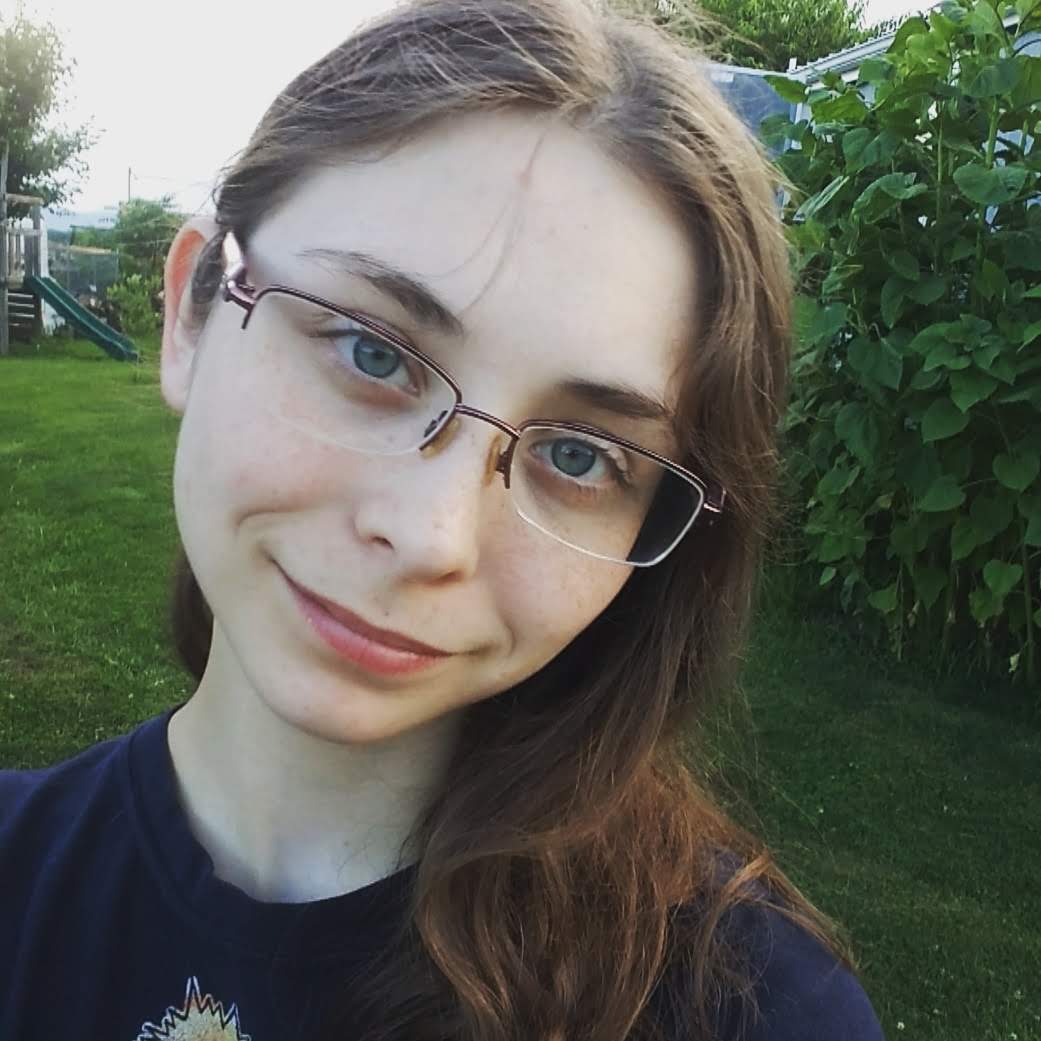
Haunted MTL Original – The Grand Finale – Liam Moran
More Videos
Published
4 years agoon
By
Shane M.“The Grand Finale” by Liam Moran
I’m one of the few who can honestly say they were there when the big change happened in the literary community. There were eighteen of us to be exact; most of us came alone. Several others will tell you they were there and recount their stories. Ninety-nine percent of the time they’re full of shit. But I’ll tell you how it started. I was there. I saw the truth.
We were in this dive bar called The Starving Artist. It got its name from a pair of friends—one wannabe writer and one wannabe actor—who realized they’ll never support themselves on their coveted jobs, so they opened a bar with a suitably self-deprecating name. The actor died of an overdose a few years back, so only the failed writer runs the place now.
But when they first opened it, and to this day, they wanted to make it unique, so in the corner of the bar was a stage where people would do standup or read their short stories or poetry or grab an acoustic guitar and sing their sorrows. Every once in a while, someone would try an incredibly low-budget play. No one really listened to anyone who was performing that much, unless the performers brought friends. Typically, the people would mull over what they hate about their lives and drink away their sorrows. Occasionally they’d listen for a minute or two, but then go back to their own business and order another drink. When you performed you neither did nor didn’t perform in a way. I, personally, wouldn’t count it as performing. There wouldn’t be any applause. There wouldn’t be any boos. Nobody listened after all.
The place was dark. On the walls you could see the bookshelves the owner put there, but from more than five feet away you couldn’t read what the titles of the books were or who the authors were. The place stank of stale booze, body odor, and cigarettes. A hazy fog of smoke hung thick in the room.
Out in the back, behind the dumpster, there was usually someone pedaling drugs ranging from low-grade pot to black-tar heroin. It was a hotspot. Everyone knew, but none of the patrons said anything. They weren’t affiliated with Sammy or his staff, but Sammy figured a man’s got to make a living, whether through the honest way or not.
Anyway, it was at this hole-in-the-wall dive bar where dreams go to die, that I was tossing back my fourth or fifth Tullamore Dew when this guy comes on stage shaking, but with emotion, not fear. His eyes were fearless if I’ve ever saw it. He spoke as though it was hard to talk—his voice cracking and everything—with his eyes wet with tears. Good poet or not, I had to give it up for this guy’s stage presence.
He said his poem was called “The Grand Finale”. Then he started to read. It wasn’t all that good; it was a little too melodramatic for my taste, but his presence was gorgeous. I truly believed he believed in his shit. The content was a subpar depressing poem about a man questioning if he wants to end his life or not. We’ve all heard these types of poems a bunch of times, but his presence: my God!
He was shaking and choking on his words. It was hard to see because it was so dark and there was such a thick cloud of smoke in the air, but I think he managed to squirt a tear or two out. This guy may not be the best poet, but I figured if this doesn’t work out for him, he should definitely try acting.
So he rambled about being friendless and how his family turned their backs on him and he lost his faith and all that whiney-shit. But the tremoring, the redness in his eyes, the forced cracking words being pushed out of a dry throat, the pauses for him to swallow back tears; now that was the real show. That was the real art.
My belief in his fearlessness started to change a bit. Something about him made me think that he was in some way scared—just not about performing. He had no issue with that, but there was something else that I just couldn’t figure out.
I ordered my fifth or sixth whiskey and watched this man bare his soul. I took a few hits from the drink and soaked in his performance.
On his last stanza, he reached into his coat pocket and pulled out a gun. Nobody screamed, but slowly the room became silent and they focused on the man holding the gun. The man was straight up sobbing, and finally I realized what he was scared of.
We all said we didn’t know what was going to happen—some of us even managed to convince ourselves—but we all knew. We really did. But to interrupt such a performance would be a greater sin.
I can’t tell you how the poem began, or any of the lines in the middle, but I can tell you the last one; I’ll never forget it.
The man put the gun to his head and said, “And that is my grand finale.” He paused, choked back some tears and then croaked, “Goodbye.” Then he pulled the trigger and blew his brains out in front of the enraptured eighteen people.
Most people would assume that after such a scene everyone would scream and a chaotic Helter Skelter commotion would ensue. But at this poetry reading late in the night, there was nothing but serenity and admiration.
When it happened, everyone was silent. Nobody moved as the gunshot echoed in our ears. We held our drinks stationary and we sat there shocked. Then somebody started clapping. Another man joined him. Within a matter of seconds, we all were clapping and shouting our congratulations. It was beautiful. None of us had seen anything like it. A poem had to be honest if you gave it that kind of an ending.
The problem people had with poets—mainly poets who use poetry as a way to cope, which is most of them—is that they talk about their depression and hopelessness and despair, but nobody could fully know if this was true or not. As for that corpse that laid in front of us, nobody doubted his depression. Nobody doubted his hopelessness. Nobody doubted his despair. How could you? His body was still warm even though a quarter of his head was missing. He not only wrote about his pain; he followed through with it. He was the only real poet any of us ever knew.
The applause continued for several minutes even though nobody took a bow, and nobody was there to realize we were applauding them. But we did it for the art. We did it for the honesty.
The police and ambulance showed up. I always wondered why they even bothered calling the ambulance when the top of his head was missing. He shot a magnum revolver clean through temple to temple. I don’t think any EMT could fix that at that point. Even Dr. Frankenstein would need an intact brain.
One of the men who was at the infamous and seminal performance was a literary critic for a magazine. He wasn’t expecting to go there for a story; he was just grabbing a drink to not focus on life like the rest of us. But he found his story there and wrote a cover story on ‘honest realism’. It was realism all the way through. You don’t stop at an ambivalence to suicide or alluding to suicide, you go all the way. The literary crowd ate it up. We found out the poet’s name: Guy Sanders. Nobody heard of him before, but now he was the hottest name in town. Nobody knew anything else about him, and few people could quote more than one line that he had written, but he was a sensation. He built up a fan base and, over time, imitators.
#
It started off with people trying to make a name for themselves. Nobodies who saved up a particular short story or poem as their farewell, read it, and killed themselves to the sound of booming applause. The government wouldn’t allow public suicide, so they used a euphemism. They would say they were performing their ‘Grand Finale’, and everyone knew what it meant.
They sold out theatres—and these were nobodies—and people would camp outside to buy tickets to their suicides. They outsold the bigtime poets and authors, whether their fame came from being critically acclaimed or from commercial popularity, it didn’t matter. People didn’t want to see them; they’d much prefer to see a nobody slice their neck open or swallow a bottle of sleeping pills as they drift into nothingness. So the bigtime authors and poets had to join the fray if they wanted their legacy to stay relevant.
The ones who made a name for themselves previous to the spate of public suicides had an advantage. They would say they were doing readings across the country—the more popular ones went across the world—saying that this was their ‘Farewell Tour’. Performing their ‘Grand Finale’ was code for a stage event; but if they were going on tour it was, ‘Farewell Tour’. That was code that they would commit suicide somewhere on that tour. The benefit to this was they could drag it out and get more fame or money for this.
There was still a benefit for getting money. Even if you did die, you got to decide what happens with that money afterwards. Many writers are narcissistic people, so several of them chose to build monuments in their honor. Others chose a beneficiary, like a friend or family member. Whatever you chose to do with your money after you died was your business; it was up to the place holding the event or tour to follow through with it and obey your wishes.
The phrases started coming out. “Anybody who’s anybody in literature is dead.” “You have to be dead to be in this business.” A Time magazine cover read, “Can Death Breathe New Life into Literature?”
#
It was during this new and exciting time that I tried to climb aboard this train, only I didn’t want to die. Luckily for me, I had my brother who was a doctor, and my best friend was a plastic surgeon. The plan was set.
I gave my first performance of “The Grand Finale” and was shocked by how many people came. I’m embarrassed to say that I had stage fright. I felt envious of all those other performers who did this before me. Granted, if all goes according to plan, nobody will recognize me, but unlike me, they never intended to perform again.
So, I did my act, performed my “Grand Finale” and then downed a bottle of pills and felt myself drift into nothingness. By the time I lost my ability to move and felt myself drifting away, the curtain dropped accompanied with thunderous applause. I closed my eyes and it all went black.
When I came to, I inhaled in shock as I smelled burned hair. My chest burned and I noticed an AED machine hooked up to me. I was lying in the back of the van with my brother, Harry, leaning over me.
“Jesus, Chuck,” he said to me, panting only slightly less than I, “I thought I lost you.”
“Sorry to disappoint,” I said through deep gasps.
Harry inserted a syringe into a vein in my right arm and muttered, “To counteract the pills.”
“I’ve never been one for needles, but I think I can officially say I’ve made bigger sacrifices to make the big bucks.” I smiled.
“Fuck, you’re crazy,” my friend Reggie said from the driver’s seat. “I can’t believe I signed up for this.”
“It’s because you know as crazy as it might be, it’ll make all three of us rich as kings,” I told him.
“So what do we do now?” Reggie asked.
“You got the corpse?” I asked.
Hank unzipped the body bag next to me. The body was fresh—almost as if it rose six feet as soon as it went six feet under. The face that looked back at me was an almost uncanny resemblance of mine.
“Spooky,” I muttered. “Got to hand it to you Reggie, you’re a damn good plastic surgeon.”
“You’re a sick man, Chuck,” Reggie says. “And you’re helping to dig up the body next time. I’m not a superstitious man, but gravedigging at the dead of night can give anyone the creeps.”
“Come on,” I told him. “I’m already putting in most of the risk as is.”
Harry was checking my vital signs when he grunted matter-of-factly, “It would reduce the time of our highest potential of getting caught by a third.”
“So…,” Reggie said, “anyone willing to answer the question I asked earlier? What do we do now?”
“We drop dead-me off at the hospital,” I nodded my head over to the corpse beside me, “then we keep real-me hidden until they pay Harry, then we move, you change our faces, we change our identities, and then we keep doing it until we’ve all made enough money to never work again,” I said matter-of-factly.
And that’s exactly what we did. I put down my brother, Harry, as the beneficiary to my staged suicide, so we all waited for a check to come in the mail and eagerly waited to see how much it was.
“Seventy-eight thousand?!” I shouted. “I killed myself up there and they don’t even give me six digits?!” I paced around steaming and ranting.
Reggie piped in, “The problem is the pills. Nobody wants to pay that much to see a man slowly fade away. They need something more dramatic, realer.”
“Please,” I said. “The audience never knows which way one of these suicides will go, so the method isn’t the problem. Maybe it’s just bad luck. We’ll try this again and see what happens.”
So we changed faces, changed identities, and did it again—this time with a noose. I hung in front of the crowd for a long period of time with a makeshift knot to avoid complete suffocation. Unfortunately, our tying skills weren’t the best, so I did choke a bit on the noose. My limbs went numb as the curtain dropped and, as I saw my brother and Reggie hurrying toward me, I blacked out from the lack of airflow. Once they dragged me outside and the coast was clear, Harry performed CPR and, just like that, I was brought back to life.
I coughed and regained my terrified suffocated breaths. We got the check and it was up to a couple hundred grand. That’s when I realized this was going to take longer than I thought, so I devised a new plan.
After moving and changing my identity once again, I got a novel published, which was pretty easy now that a large percentage of writers have offed themselves. Now there’s less competition. So, I build up a bit of notoriety, and then I let it leak all over social media, that I will be doing my “Farewell Tour” in two years to this date. I also let rumors leak on the internet that it will be a bloody ending. I pump out two more novels in that time and then I begin my tour. This time we’re not holding back. The audience wants gore, so that’s what we’re going to give them.
#
I wait until the very last day of the tour so I can soak up as much money as I can. Now that the Grand Finale is finally here, and everyone knows this is my last opportunity to kill myself, the place is packed.
Now this is the payoff. This is what’s going to make Harry, Reggie, and I never have to work a day in our lives again.
So, I give my reading, and get to my Grand Finale. I think I’m overacting. The first couple of times it seemed easy to shake and mimic the emotion of the first literary suicide I witnessed at The Starving Artist all those years ago. But now, with two suicides already under my belt, I don’t feel as scared. I’ve become used to killing myself at this point.
I get to the end of my Grand Finale and then slit my wrists and just stare downward in the chair. The applause comes in slow, but then picks up and soon people are screaming and whistling as if they’re asking for an encore they can’t possibly receive.
I look upward for a second and realize no curtains are dropping. Why’s it taking so long?
The blood continues to pour out of me and onto the carpet as the crowd gets louder and louder. When is the curtain going to drop? I wonder.
My head grows faint, and the place starts to look dimmer. There’s a lot more blood than I expected. I start to fear I may have nicked a major artery. It’s harder to see. It seems foggier. For some reason I’m reminded of the smoke-filled ambience of The Starving Artist.
When it’s too hard to lift my head, I see Reggie and Harry sprinting right at me—clearly visible by the entire audience—and then I drift off.
#
I come to in the back of a van again with a blood bag in an IV hooked up to my arm. My brother’s bright red, surgically altered face shows pure panic as his usually calm and steady hands shake in terror while trying to suture up my wrists.
“His eyes are open!” He shouts over his shoulder, then turns to me. “We’re taking you to a hospital. We have no other choice. Just hang on!” my brother screams.
I try but can’t speak. I see a tear roll down my brother’s cheek.
“You think we’re still getting paid?” Reggie asks from the front seat.
“Shut up, Reggie!” my brother shouts.
“I just want to make sure it wasn’t all a waste, you know,” Reggie says. “In his memory.”
“Shut the fuck up, Reggie!” my brother shouts once again. Then he turns back to me and frantically chants, “Come on, Chuck! Hang in there! Come on, you can do it!”
My eyes get foggier and dimmer, reminding me about the dim, smoke-filled room where Guy Sanders gave the only performance anyone could remember from him.
I’m fading. I grow cold. I need to accept it. Whether willingly or accidentally, in a packed auditorium or alone in a hospital bed, we all give our grand finale sometime.
END
Liam Moran has been published in Coffin Bell Journal, Ripples in Space, and Haunted MTL, and his two novels, ‘Saving Fiction’ and ‘Love is Delusional’ are available on Amazon. Originally from Levittown, New York, he now resides in the suburbs of Chicago, where he enjoys reading, writing, and catching the Sunday games with some friends at a local sports bar, where he engages in his love/hate relationship with the Buffalo Bills. He invites fans to follow his Facebook page @LiamMoranAuthor or go to his website at amazon.com/author/liammoran and to feel free to message him if they so desire.

You may like
Original Creations
Goodbye for Now, a Short Story by Jennifer Weigel
Published
1 month agoon
March 30, 2025What if ours weren’t the only reality? What if the past paths converged, if those moments that led to our current circumstances got tangled together with their alternates and we found ourselves caught up in the threads?
Marla returned home after the funeral and wake. She drew the key in the lock and opened the door slowly, the looming dread of coming back to an empty house finally sinking in. Everyone else had gone home with their loved ones. They had all said, “goodbye,” and moved along.
Her daughter Misty and son-in-law Joel had caught a flight to Springfield so he could be at work the next day for the big meeting. Her brother Darcy was on his way back to Montreal. Emmett and Ruth were at home next door, probably washing dishes from the big meal they had helped to provide afterward, seeing as their kitchen light was on. Marla remembered there being food but couldn’t recall what exactly as she hadn’t felt like eating. Sandwiches probably… she’d have to thank them later.
Marla had felt supported up until she turned the key in the lock after the services, but then the realization sank deep in her throat like acid reflux, hanging heavy on her heart – everyone else had other lives to return to except for her. She sighed and stepped through the threshold onto the outdated beige linoleum tile and the braided rag rug that stretched across it. She closed the door behind herself and sighed again. She wiped her shoes reflexively on the mat before just kicking them off to land in a haphazard heap in the entryway.
The still silence of the house enveloped her, its oppressive emptiness palpable – she could feel it on her skin, taste it on her tongue. It was bitter. She sighed and walked purposefully to the living room, the large rust-orange sofa waiting to greet her. She flopped into its empty embrace, dropping her purse at her side as she did so.
A familiar, husky voice greeted her from deeper within the large, empty house. “Where have you been?”
Marla looked up and glanced around. Her husband Frank was standing in the doorway to the kitchen, drying a bowl. Marla gasped, her hand shooting to her mouth. Her clutched appendage took on a life of its own, slowly relinquishing itself of her gaping jaw and extending a first finger to point at the specter.
“Frank?” she spoke hesitantly.
“Yeah,” the man replied, holding the now-dry bowl nestled in the faded blue-and-white-checkered kitchen towel in both hands. “Who else would you expect?”
“But you’re dead,” Marla spat, the words falling limply from her mouth of their own accord.
The 66-year old man looked around confusedly and turned to face Marla, his silver hair sparkling in the light from the kitchen, illuminated from behind like a halo. “What are you talking about? I’m just here washing up after lunch. You were gone so I made myself some soup. Where have you been?”
“No, I just got home from your funeral,” Marla spoke quietly. “You are dead. After the boating accident… You drowned. I went along to the hospital – they pronounced you dead on arrival.”
“I don’t know what you’re talking about,” Frank said. “What boating accident?”
“The sailboat… You were going to take me out,” Marla coughed, her brown eyes glossed over with tears.
“We don’t own a sailboat,” Frank said bluntly. “Sure, I’d thought about it – it seems like a cool retirement hobby – but it’s just too expensive. We’ve talked about this, we can’t afford it.”
Marla glanced out the bay window towards the driveway where the small sailboat sat on its trailer, its orange hull reminiscent of the Florida citrus industry, and also of the life jacket Frank should have been wearing when he’d been pulled under. Marla cringed and turned back toward the kitchen. She sighed and spoke again, “But the boat’s out front. The guys at the marina helped to bring it back… after you… drowned.”
Frank had retreated to the kitchen to put away the bowl. Marla followed. She stood in the doorway and studied the man intently. He was unmistakably her husband, there was no denying it even despite her having just witnessed his waxen lifeless body in the coffin at the wake before the burial, though this Frank was a slight bit more overweight than she remembered.
“Well, that’s not possible. Because I’m still here,” Frank grumbled. He turned to face her, his blue eyes edged with worry. “There now, it was probably just a dream. You knew I wanted a boat and your anxiety just formulated the worst-case scenario…”
“See for yourself,” Marla said, her voice lilting with every syllable.
Frank strode into the living room and stared out the bay window. The driveway was vacant save for some bits of Spanish moss strewn over the concrete from the neighboring live oak tree. He turned towards his wife.
“But there’s no boat,” he sighed. “You must have had a bad dream. Did you fall asleep in the car in the garage again?” Concern was written all over his face, deepening every crease and wrinkle. “Is that where you were? The garage?”
Marla glanced again at the boat, plain as day, and turned to face Frank. Her voice grew stubborn. “It’s right here. How can you miss it?” she said, pointing at the orange behemoth.
“Honey, there’s nothing there,” Frank exclaimed, exasperation creeping into his voice.
Marla huffed and strode to the entryway, gathering her shoes from where they waited in their haphazard heap alongside the braided rag run on the worn linoleum floor. She marched out the door as Frank took vigil in its open frame, still staring at her. She stomped out to the boat and slapped her hand on the fiberglass surface with a resounding smack. The boat was warm to the touch, having baked in the Florida sun. She turned back towards the front door.
“See!” she bellowed.
The door stood open, empty. No one was there, watching. Marla sighed again and walked back inside. The vacant house once again enveloped her in its oppressive emptiness. Frank was nowhere to be found.

So I guess it’s goodbye for now. Feel free to check out more of Jennifer Weigel’s work here on Haunted MTL or here on her website.
Today on Nightmarish Nature we’re gonna revisit The Blob and jiggle our way to terror. Why? ‘Cause we’re just jellies – looking at those gelatinous denizens of the deep, as well as some snot-like land-bound monstrosities, and wishing we could ooze on down for some snoozy booze schmoozing action. Or something.
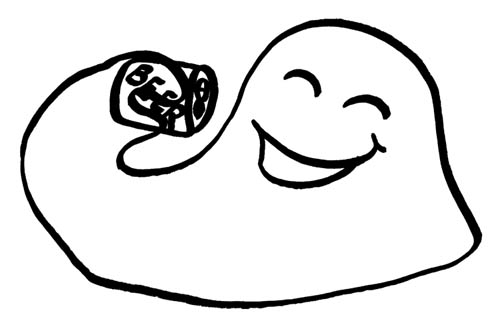
Honestly, I don’t know what exactly it is that jellyfish and slime molds do but whatever it is they do it well, which is why they’re still around despite being among the more ancient organism templates still in common use.
Jellyfish are on the rise.
Yeah, yeah, some species like moon jellies will hang out in huge blooms near the surface feeding, but that’s not what I meant. Jellyfish populations are up. They’re honing in on the open over-fished ocean and making themselves at home. Again.
And, although this makes the sea turtles happy since jellies are a favorite food staple of theirs, not much else is excited about the development. Except for those fish that like to hide out inside of their bells, assuming they don’t accidentally get eaten hanging out in there. But that’s a risk you gotta take when you’re trying to escape predation by surrounding yourself in a bubble of danger that itself wants to eat you. Be eaten or be eaten. Oh, wait…
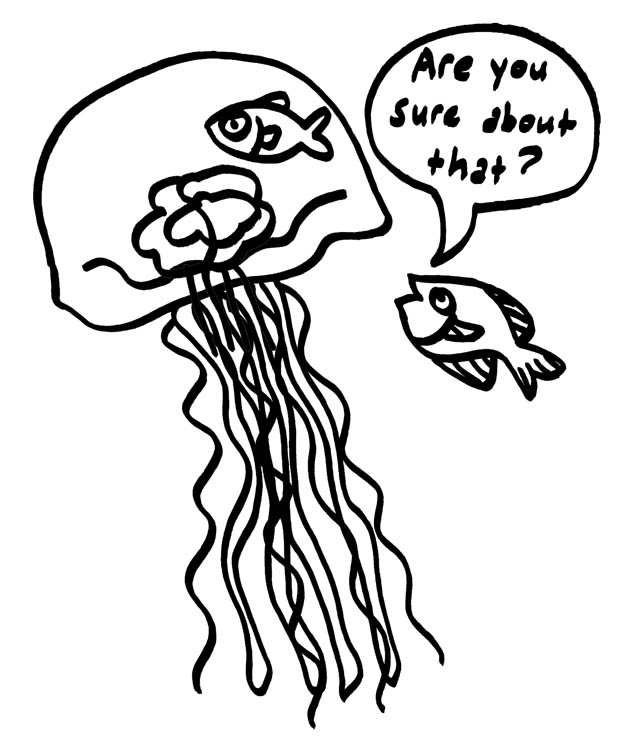
So what makes jellies so scary?
Jellyfish pack some mighty venom. Despite obvious differences in mobility, they are related to anemones and corals. But not the Man o’ War which looks similar but is actually a community of microorganisms that function together as a whole, not one creature. Not that it matters when you’re on the wrong end of a nematocyst, really. Because regardless what it’s attached to, that stings.
Box jellies are among the most venomous creatures in the world and can move of their own accord rather than just drifting about like many smaller jellyfish do. And even if they aren’t deadly, the venom from many jellyfish species will cause blisters and lesions that can take a long time to heal. So even if they do resemble free-floating plastic grocery bags, you’d do best to steer clear. Because those are some dangerous curves.
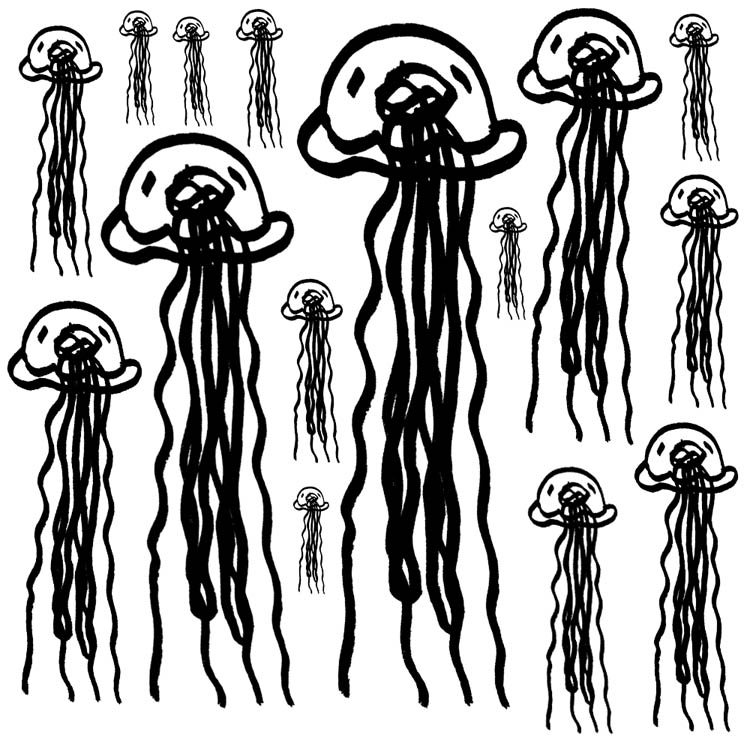
But what does this have to do with slime molds?
Absolutely nothing. I honestly don’t know enough about jellyfish or slime molds to devote the whole of a Nightmarish Nature segment to either, so they had to share. Essentially, this bit is what happened when I decided to toast a bagel before coming up with something to write about and spent a tad too much time in contemplation of my breakfast. I guess we’re lucky I didn’t have any cream cheese or clotted cream…
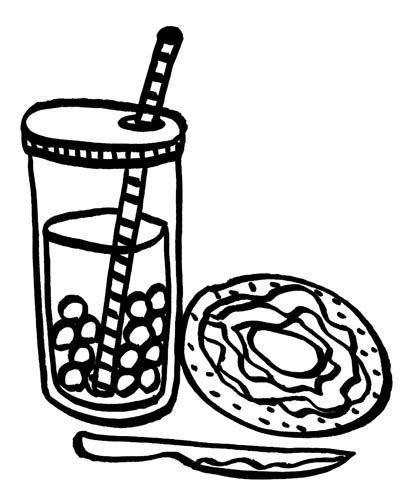
Oh, and also thinking about gelatinous cubes and oozes in the role-playing game sense – because those sort of seem like a weird hybrid between jellies and slime molds, as does The Blob. Any of those amoeba influenced creatures are horrific by their very nature – they don’t even need to be souped up, just ask anyone who’s had dysentery.
And one of the most interesting thing about slime molds is that they can take the shortest path to food even when confronted with very complex barriers. They are maze masterminds and would give the Minotaur more than a run for his money, especially if he had or was food. They have even proven capable of determining the most efficient paths for water lines or railways in metropolitan regions, which is kind of crazy when you really think about it. Check it out in Scientific American here. So, if we assume that this is essentially the model upon which The Blob was built, then it’s kind of a miracle anything got away. And slime molds are coming under closer scrutiny and study as alternative means of creating computer components are being explored.
Jellies are the Wave of the Future.
We are learning that there may be a myriad of uses for jellyfish from foodstuffs to cosmetic products as we rethink how we interact with them. They are even proving useful in cleaning up plastic pollution. I don’t know how I feel about the foodstuff angle for all that they’ve been a part of various recipes for a long time. From what I’ve seen of the jellyfish cookbook recipes, they just don’t look that appealing. But then again I hate boba with a passion, so I’m probably not the best candidate to consider the possibility.
So it seems that jellies are kind of the wave of the future as we find that they can help solve our problems. That’s pretty impressive for some brainless millions of years old critter condiments. Past – present – perpetuity! Who knows what else we’d have found if evolution hadn’t cleaned out the fridge every so often?
Feel free to check out more Nightmarish Nature here.
Original Series
Lucky Lucky Wolfwere Saga Part 4 from Jennifer Weigel
Published
2 months agoon
March 17, 2025Continuing our junkyard dawg werewolf story from the previous St. Patrick’s Days… though technically he’s more of a wolfwere but wolfwhatever. Anyway, here are Part 1 from 2022, Part 2 from 2023 and Part 3 from 2024 if you want to catch up.
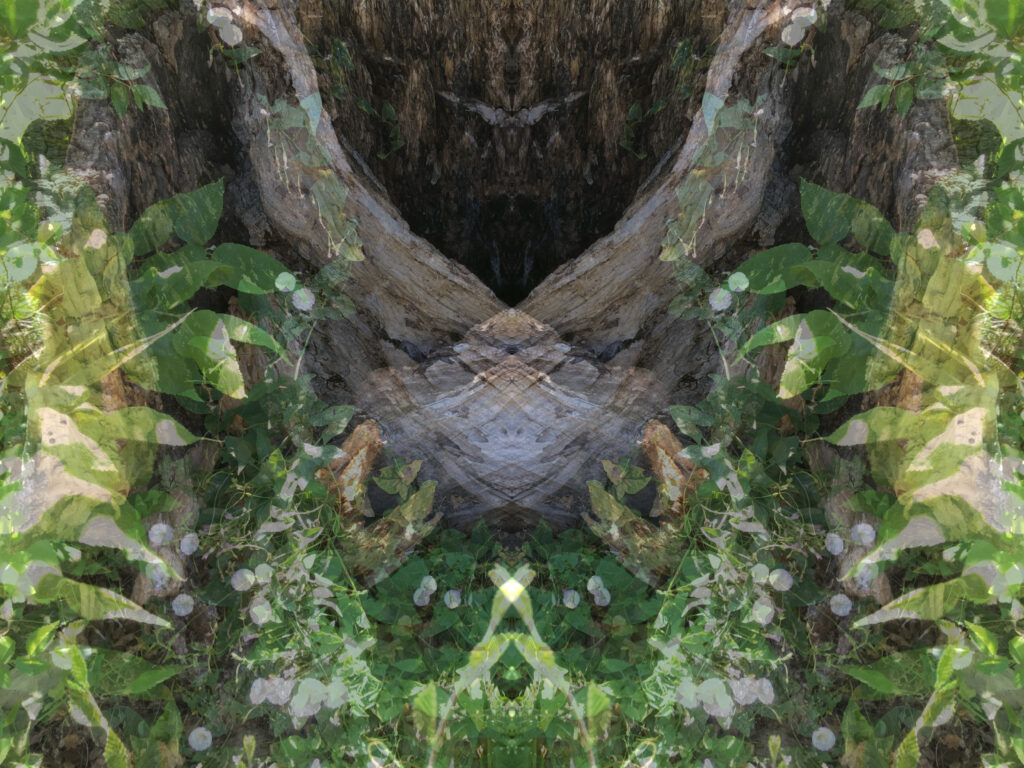
Yeah I don’t know how you managed to find me after all this time. We haven’t been the easiest to track down, Monty and I, and we like it that way. Though actually, you’ve managed to find me every St. Patrick’s Day since 2022 despite me being someplace else every single time. It’s a little disconcerting, like I’m starting to wonder if I was microchipped way back in the day in 2021 when I was out lollygagging around and blacked out behind that taco hut…
Anyway as I’d mentioned before, that Scratchers was a winner. And I’d already moved in with Monty come last St. Patrick’s Day. Hell, he’d already begun the process of cashing in the Scratchers, and what a process that was. It made my head spin, like too many squirrels chirping at you from three different trees at once. We did get the money eventually though.
Since I saw you last, we were kicked out of Monty’s crap apartment and had gone to live with his parents while we sorted things out. Thank goodness that was short-lived; his mother is a nosy one for sure, and Monty didn’t want to let on he was sitting on a gold mine as he knew they’d want a cut even though they had it made already. She did make a mean brisket though, and it sure beat living with Sal. Just sayin.
Anyway, we finally got a better beater car and headed west. I was livin’ the dream. We were seeing the country, driving out along old Route 66, for the most part. At least until our car broke down just outside of Roswell near the mountains and we decided to just shack it up there. (Boy, Monty sure can pick ‘em. It’s like he has radar for bad cars. Calling them lemons would be generous. At least it’s not high maintenance women who won’t toss you table scraps or let you up on the sofa.)
We found ourselves the perfect little cabin in the woods. And it turns out we were in the heart of Bigfoot Country, depending on who you ask. I wouldn’t know, I’ve never seen one. But it seems that Monty was all into all of those supernatural things: aliens, Bigfoot, even werewolves. And finding out his instincts on me were legit only added fuel to that fire. So now he sees himself as some sort of paranormal investigator.
Whatever. I keep telling him this werewolf gig isn’t all that it’s cracked up to be, and it doesn’t work like in the movies. I wasn’t bitten, and I generally don’t bite unless provoked. He says technically I’m a wolfwere, to which I just reply “Where?” and smile. Whatever. It’s the little things I guess. I just wish everything didn’t come out as a bark most of the time, though Monty’s gotten pretty good at interpreting… As long as he doesn’t get the government involved, and considering his take on the government himself that would seem to be a long stretch. We both prefer the down low.
So here we are, still livin’ the dream. There aren’t all that many rabbits out here but it’s quiet and the locals don’t seem to notice me all that much. And Monty can run around and make like he’s gonna have some kind of sighting of Bigfoot or aliens or the like. As long as the pantry’s stocked it’s no hair off my back. Sure, there are scads of tourists, but they can be fun to mess around with, especially at that time of the month if I happen to catch them out and about.
Speaking of tourists, I even ran into that misspent youth from way back in 2021 at the convenience store; I spotted him at the Quickie Mart along the highway here. I guess he and his girlfriend were apparently on walkabout (or car-about) perhaps making their way to California or something. He even bought me another cookie. Small world. But we all knew that already…
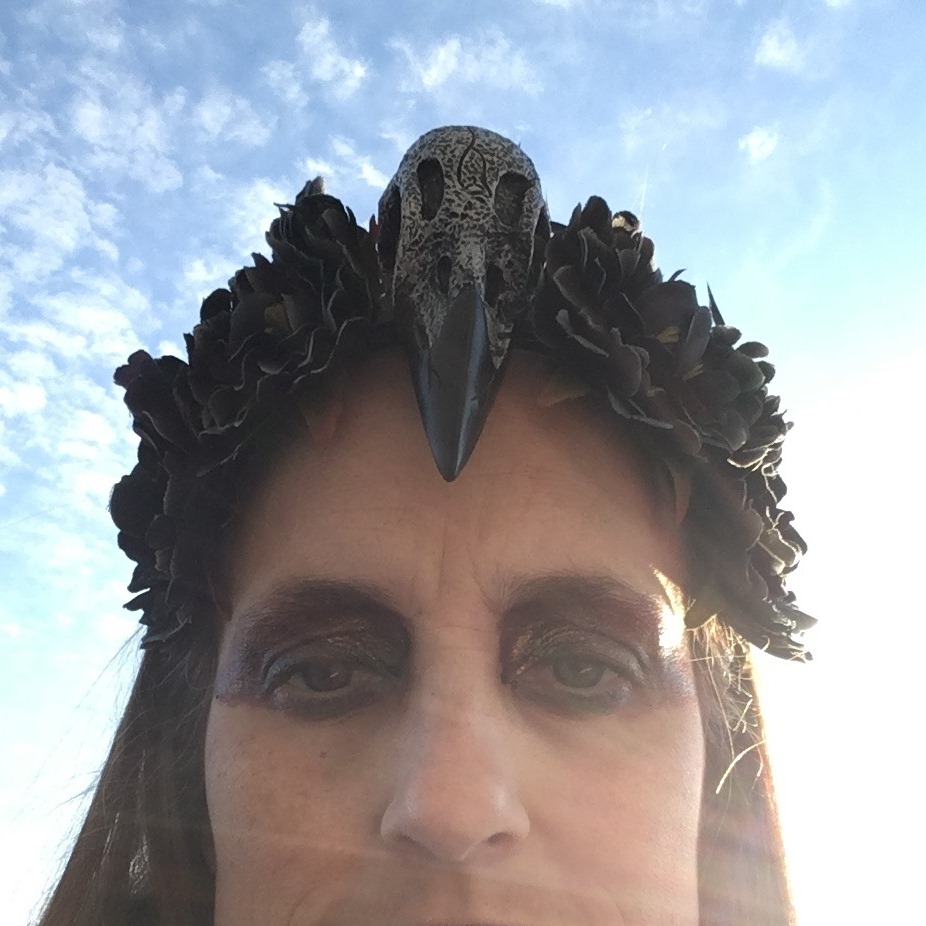
If you enjoyed this werewolf wolfwere wolfwhatever saga, feel free to check out more of Jennifer Weigel’s work here on Haunted MTL or here on her website.


